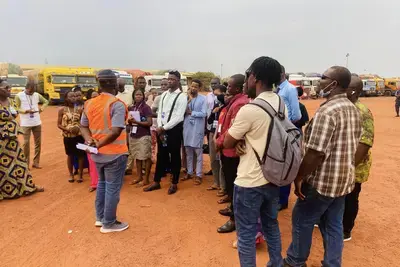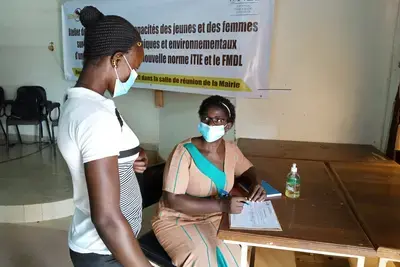Success Story
Burkina Faso President Steps Down in the Face of Popular Protests
President Blaise Compaoré of Burkina Faso stepped down today following days of massive popular protests against attempts to eliminate a constitutionally mandated term limit.
“The Burkinabe people have sent a strong message to their leaders about efforts to extend their stay in power through constitutional changes” said NDI President Kenneth Wollack. “Timely and strong international support is now needed to help ensure a peaceful and inclusive democratic transition process.”
President Compaoré, who first took power in 1987 through a military coup, was term limited and required to vacate the presidency at the end of his term in 2015. Instead, he sought to amend the country's constitution so he could run again.
In an unprecedented response, more than a million people took to the streets to protest and set the National Assembly building on fire to prevent an Oct. 30 vote on amending Article 37 of the constitution.
Both the White House and members of Congress have issued statements of support for the Burkinabe democrats.
On Oct. 28, Senator Chris Coons, D-DE, chair of the Senate Foreign Relations Subcommittee on African Affairs, called on Compaoré and the National Assembly to withdraw plans to amend the constitution, citing the African Union Charter on Democracy, Elections and Governance. The charter “explicitly rejects constitutional changes in order to maintain power for the benefit of the incumbent as ‘illegal,’ and an amendment to Article 37 is a clear violation of this principle,” Coons said.
House Foreign Affairs Committee Chairman Ed Royce, R-CA, in an Oct. 29 statement, described Compaoré’s effort as a “misguided move that betrays his fellow citizens. A constitution is the bedrock of a functioning democracy and amending it to benefit one individual would directly sabotage good governance.”
On Oct. 28, the U.S. State Department said, “…The United States emphasizes that constitutionally mandated term limits provide an important mechanism to hold heads of state accountable, ensure peaceful and democratic transfers of power, and give new generations the opportunity to compete for political office and elect new leaders.”
And the White House, on Oct. 30, said it was “deeply concerned about the deteriorating situation in Burkina Faso resulting from efforts to amend the constitution…. We believe democratic institutions are strengthened when established rules are adhered to with consistency.”
Following Compaoré’s departure, the chief of the armed forces took over as head of state until elections can be held. The African Union (AU) has issued a statement saying it has sent "a high-level Team that will form part of a Joint Delegation comprising the AU, the Economic Community of West African States (ECOWAS) and the United Nations to Burkina Faso to consult with all the Burkinabe stakeholders."
NDI has had an office in Burkina Faso since 2004, working with Burkinabe democratic activists in political parties and civil society. Institute programs have helped them advocate successfully for the adoption and application of a quota law for women candidates; improve the role of women and youth within political parties and local councils; aid women councilors in leading community efforts to solve local problems; and advance community-based efforts to hold government accountable for delivering adequate public services.
Published Oct. 31, 2014



